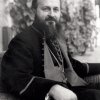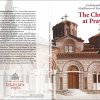John Evan Dapcevich (born September 26, 1926) is a retired state official in Alaska.
Dapcevich was born in Hazleton, Pennsylvania in 1926 to Sam and Stana Dapcevich, immigrants from Montenegro, where his father worked in coal mines. The family moved to Juneau, Alaska in 1928 living with a Serbian community, with John entering school years later. He moved to Sitka, Alaska in 1960 where he served six terms as Mayor during a span of 20 years. During his time in office, Dapcevich successfully unified the city of Sitka city with various borough governments. Upon his retirement in 1995, he moved back to Juneau.
.He also served in the Alaska Public Offices Commission and Alaska Pioneers' Homes Advisory Board, serving under Governor Steve Cowper. In addition, he previously served in the Territorial Teachers' Retirement System and as a budget analyst in the territory's fiscal and budget management office. Dapcevich also chaired the Southeast Alaska Democratic Party and the State Central Council of the Alaska Democratic Party. He was awarded a lifetime achievement award by Governor Tony Knowles in 2003. He is married to Janice and currently resides in Juneau.
From Wikipedia





